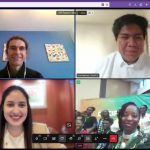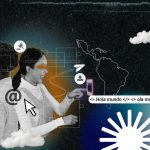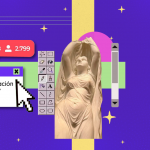The construction of Unesco’s Recommendation on Open Science that should be approved by the member states during 2021.
At the beginning of October Audrey Azoulay, the director general of Unesco, sent the draft document of the Open Science Recommendation to all the member states. The document will continue its route of debates and construction until it is presented to the General Assembly in 2021.
As part of this process, on October 19th, Unesco organized a virtual information meeting with the permanent delegations of the member states to Unesco with the Advisory Committee to present the main points and themes of the draft document. Among the members of the Advisory Committee our director was in the group who spoke for a few minutes in each topic.
The following is the intervention by Carolina Botero during this meeting:
October 19, 2020. Good morning, good afternoon and good evening, thank you for giving me the opportunity to talk to you today.
The Unesco Recommendation on open science introduces a pluriversal approach to science as a key element of the more democratic approach.
The scientific enterprise is not alien to societal inequities, it usually reflects them, and open science -just as any science- can also replicate those inequalities. In order to avoid that, I am glad to confirm that the Unesco recommendation on open science is clear that no matter how we define open science, openness is a commitment with a more inclusive way to conduct science, by doing so there is hope that we can reduce inequalities. And this is the topic I will address in this intervention.
The Unesco recommendation on open science does not refer to a different “science”, the recommendation describes the open approach to science. Thus, the document emphasizes that open science seeks a model of collective construction where the benefits and results of science are for all. To this end, the document speaks of an openness that incorporates the entire scientific cycle and goes far beyond the traditional actors.
The Unesco recommendation will help governments and scientific instituciones to push the boundaries beyond open access and open data, into other scientific concerns such as open evaluation, open licensing or open infrastructures. Apart from that, the Unesco Recommendation also addresses other three crucial and important elements of the open approach that I will discuss here:
- Openness to indigenous knowledge. The commitment of the recommendations with being open to the diversity of knowledges existent in the planet includes recognizing the rights of Indigenous Peoples to self determination that involves the right of refusal and the acknowledgement that local communities have the right to govern and make decisions on the custodianship, ownership and administration of their data, their traditional knowledge, their lands, and their resources.
- Openness to all scholarly knowledge and inquiry, this openness is recognized in line with the principle of non discrimination on the basis of income, gender, age, race, ethnicity, migratory status, disability, and geographic location, This is very important as there are many marginalized groups of people in western English-speaking science, such as women, minorities, Indigenous scholars, non-Anglophone scholars, or scholars from the less-advantaged countries in the Global South, that had suffered from historical exclusions, open science must address those inequalities not only because it is a cause of social justice but also because it is the best way to improve the quality of science.
- The fact that all societal actors should engage. Considering that an important challenge for the future of open science is not just to be able to open all the scientific cycles, but also to open the paradigm on who can engage. Open Science can only be called such if it is open to non traditional actors including civil society as activists, practitioners and civil society organizations are not only developing some of the tools and practices linked to it (like open software, open hardware, open seeds, citizen science, action research, political advocacy and open educational resources) but also because good policy in science requires scientists engagement by practitioners and activists too.
Finally, a key result of more open science in the world is the democratization of knowledge. In times of postruth and political extremism, open science and inclusive participation of different actors in the co-construction of scientific knowledge could become an important tool to prevent disinformation and extremism, because it builds citizenship and strengthens democracy. Openness to all knowledge, all scholars and all actors will help science to be the best source for good evidence based decision-making processes and a major tool for citizen scrutiny of public policies, open to critique and improvement.
But, how to put these great ideas into practice? That is the real challenge and a big part of it is to mobilize the political will within each of your countries. On the other hand, I understand that Unesco has a role too, it must stand up for the minority voices and against hegemonic positions. In order for the Recommendation not to turn into void words. we all, but especially Unesco, must stand by those principles and act upon them with political conviction.
Thanks.


